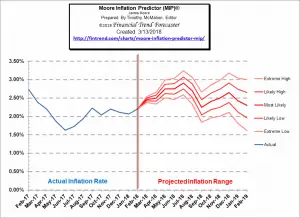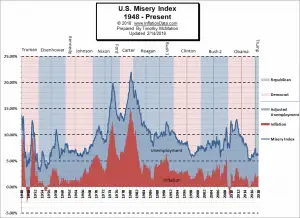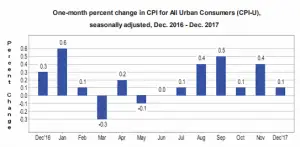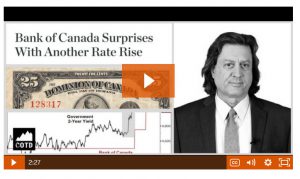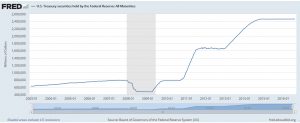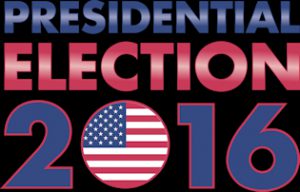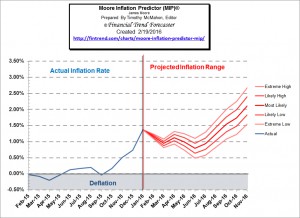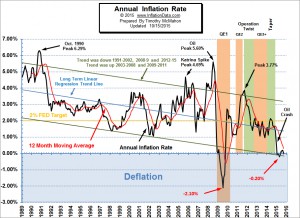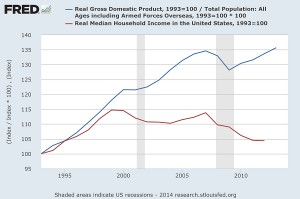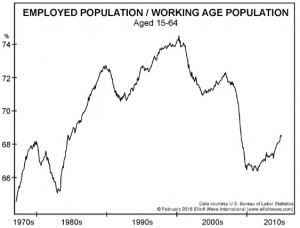The U.S. Bureau of Labor Statistics released the Annual Inflation Rate data for the year through the end of February on March 13th 2018. Annual inflation was 2.21% in February up from 2.07% in January and 2.11% in December CPI-U was 248.991 in February from 247.867 in January. Monthly Inflation was 0.45% for February and 0.54% in January. Next release April 11th Monthly Inflation is Typically High in the First Quarter Typically the monthly inflation rate is highest during the first quarter (January through March) and lowest during the last quarter (October through December). February 2018 had inflation of 0.45% which was above February 2017's 0.31% so we saw an increase in … [Read more...]
January’s Monthly Inflation 0.54%
The U.S. Bureau of Labor Statistics released the Annual Inflation Rate data for the year through the end of January on February 14th 2018. Annual inflation was 2.07% in January down from 2.11% in December CPI-U up from 246.524 to 247.867 Monthly Inflation for January 0.54% compared to 0.57% in January 2017 Next release March 13th Monthly Inflation is High, But... Typically the monthly inflation rate is highest during the first quarter (January through March) and lowest during the last quarter (October through December). January 2017 had inflation of 0.57% and so January 2018's 0.54% is right in line with that (resulting in annual inflation of 2.07%). However if … [Read more...]
Monthly Deflation, Annual Disinflation
The U.S. Bureau of Labor Statistics released the Annual Inflation Rate data for the year through the end of December on January 12th 2018. Annual inflation was 2.11% for the 12 months ending in December CPI-U down slightly from 246.669 to 246.524 Monthly Inflation for December -0.06% Next release February 14th Annual Inflation Chart Annual inflation for the 12 months ending in December 2017 was 2.11% down from 2.20% in November and slightly above the 2.04% in October. Early in 2017 inflation was above current levels at 2.50% in January, 2.74% in February, 2.38% in March, and then falling to 2.20% in April. The annual cyclical low was 0.84% in July 2016. The longer term … [Read more...]
Believe Your Own Eyes: Central Banks FOLLOW the Market
Many investors believe that the market follows the FED's monetary leadership. This sounds right because the FED is the 500 pound gorilla in the market right? It has Trillions of dollars at its disposal and isn't afraid to use it. But is this actually the case? Believe Your Own Eyes: Central Banks FOLLOW the Market By Elliott Wave International 3 Videos + 8 Charts = Opportunities You Need to See. Join this free event hosted by Elliott Wave International and you'll get a clear picture of what's next in a variety of U.S. markets. After seeing these videos and charts you will be ready to jump on opportunities and sidestep risks in some major markets. This free … [Read more...]
July Inflation Down for 3rd Consecutive Month
The U.S. Bureau of Labor Statistics (BLS) released their monthly inflation report for July on August 16th. According to the BLS Annual Inflation declined for the third consecutive month. Annual inflation was 1.13% in April, 1.02% in May, 1.01% in June and 0.84% in July. Not only did the rate of inflation fall but actual consumer prices declined as the CPI-U index declined from 241.038 to 240.647. Thus monthly inflation was -0.16%. For the year food at home was down -1.6%, energy was down -10.9%, used cars and trucks were down -3.7%, while overall transportation was down -4.9%. With all of these categories down one might wonder what actually caused the inflation rate to rise that meager … [Read more...]
Inflation, Economy, and the US Election
One of the major factors affecting an election's outcome is the nation’s economy during the election year. In terms of trading and from an investment standpoint, financial security is a huge issue. But unlike recent election years, forecasters predict a strong economy in 2016 during the presidential race. Economic conditions can change however, depending on which candidate wins. With the US Presidential Election still a good six months away (November 8, 2016), how will it affect inflation and the economy as a whole? Low Unemployment Rate Researchers in political science, project that unemployment will be at its lowest, since the election in 2000 (Bush versus Gore) when it was at 3.9%. … [Read more...]
January Inflation Up Sharply Should You Worry?
The U.S Bureau of Labor Statistics released their monthly inflation report today covering the 12 months ending in January indicating a massive jump in inflation. Should you worry? Current inflation (CPI-U) nearly doubled from 0.73% to 1.37%. The Consumer Price Index was 236.916 up from 236.525 in December. According to the BLS, the rate of decline for Energy has slowed a bit last month. Energy was down -12.6% in January, but only down -6.5% over the previous 12 months in February. Gasoline is only down -7.3% this month compared to -19.7% last month, while Fuel Oil is down -28.7% compared with -31.4% in December. The only energy commodity that is down more than previously is … [Read more...]
Deflation Returns in September
The Bureau of Labor Statistics (BLS) released their inflation numbers for the year ending September 30th on October 15, 2015. Monthly inflation was negative (disinflationary) for the second month in a row resulting in annual deflation of -0.04%. Although at this level the deflation is so slight that the BLS rounds it to Zero. So basically prices are on par with those of a year ago. However, that doesn't mean that all prices are identical to those of a year ago. In the report issued by the BLS yesterday we note that food prices are up 1.4% over a year ago while energy prices are down -18.4%. and all other items excluding food and energy are up 1.9% so we see that the primary cause of the … [Read more...]
US Consumer Spending vs. FED Inflation Decision
The Fed will meet on the 16th and 17th of September to decide whether it’s time to normalize its accommodative monetary policy. But despite vice-chairman Stanley Fischer’s hints at an inflation increase in September, analysts still think that several factors complicate the FED’s decision. Recent turbulence in equities markets across the globe as well as uncertainties about China’s market are only some of the factors putting a damper on the economy. During an Economic Policy Symposium held in Wyoming this August, central bankers discussed how inflation would finally rise despite these issues. After all, the factors that had been holding it down (including fading oil prices, downward … [Read more...]
A Very Weak Economic Recovery
By Elliott Wave International Editor's note: The following article is excerpted from Elliott Wave International's new free report, "U.S. Economy Still on Life Support." For years, the government has manipulated its unemployment statistics to line up with its claim that the economy has recovered strongly. But that's not ALL the government is hiding from you. From foodstuffs, to crude oil prices, to GDP, the numbers and analysis reported by the government and mainstream financial press are misleading at best, downright falsehoods at worst. Get the hidden truth -- click here to read the full two-part report now >> For years, the government has been manipulating its unemployment … [Read more...]

